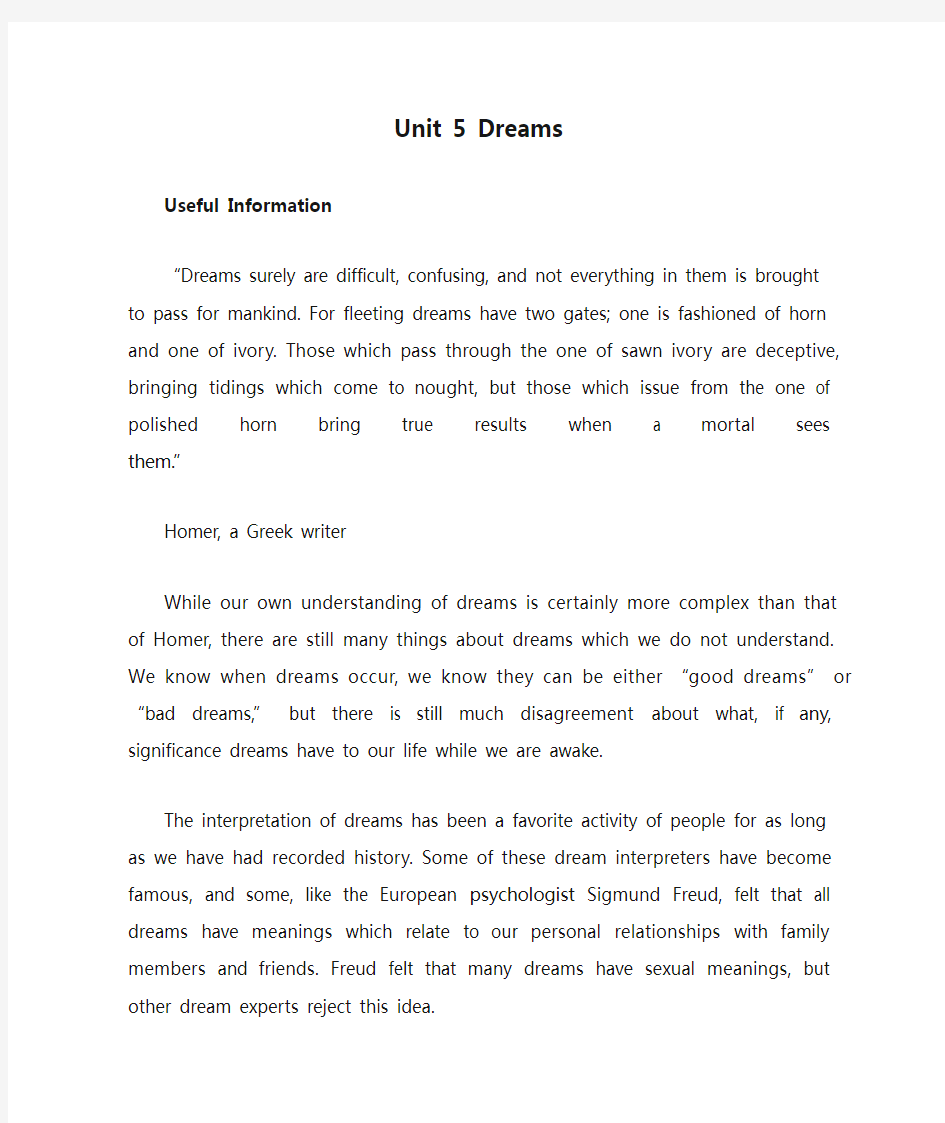Unit 5 Dreams新编大学英语第二版第二册教案

- 1、下载文档前请自行甄别文档内容的完整性,平台不提供额外的编辑、内容补充、找答案等附加服务。
- 2、"仅部分预览"的文档,不可在线预览部分如存在完整性等问题,可反馈申请退款(可完整预览的文档不适用该条件!)。
- 3、如文档侵犯您的权益,请联系客服反馈,我们会尽快为您处理(人工客服工作时间:9:00-18:30)。
Unit 5 Dreams
Useful Information
“Dreams surely are difficult, confusing, and not everything in them is brought to pass for mankind. For fleeting dreams have two gates; one is fashioned of horn and one of ivory. Those which pass through the one of sawn ivory are deceptive, bringing tidings which come to nought, but those which issue from the one of polished horn bring true results when a mortal sees them.”
Homer, a Greek writer
While our own understanding of dreams is certainly more complex than that of Homer, there are still many things about dreams which we do not understand. We know when dreams occur, we know they can be either “good dreams” or “bad dreams,” but there is still much disagreement about what, if any, significance dreams have to our life while we are awake.
The interpretation of dreams has been a favorite activity of people for as long as we have had recorded history. Some of these dream interpreters have become famous, and some, like the European psychologist Sigmund Freud, felt that all dreams have meanings which relate to our personal relationships with family members and friends. Freud felt that many dreams have sexual meanings, but other dream experts reject this idea.
Good dreams include those in which we see ourselves succeeding in some difficult or pleasant activity such as singing, dancing, talking with our friends, or experiencing the happiness which may not occur in our waking hours. Many persons report dreams of competing in athletic competitions or music competitions, or of acting in a dramatic production. The performance in these events can go beyond anything we might experience in reality. Who among us has not dreamed of spending pleasant hours with our real or imaginary lover, enjoying his or her company in ways known only to those who have loved? Many persons report dreaming of flying, jumping great distances or heights, or defeating enemies in battle. Interpreters of such dreams give varied meanings, most of which are probably not very reliable. But, we often awake from good dreams in a good mood, rested and ready to face the day.
Bad or unpleasant dreams include those which frighten us, recall unpleasant experiences from our lives, or present problems for which there is no evident solution. Dreams of failing an exam at school, dreams of losing a job or a good friend, dreams of accidents or death of a loved one in our family, etc. are unsettling and not easily understood. Some dream experts believe these dreams are now a threatening way to face
a problem from real life. They give us a way to deal with the problem so that we may find it less stressful in our waking hours.
Whether good or bad, dreams are common for most persons. There is evidence that dreams also occur in other animals such as dogs, apes, etc., though, of course, we cannot know for sure. Dogs who whimper, growl, or move their legs and feet as if running while asleep are probably dreaming. This is a very common thing known to dog owners who have observed their pets closely.
In a sense, progress would not occur in life if it were not for the dreams of those who are responsible for solving problems in our society. Inventors, musicians, and many others say that they first dreamed of an idea, and then started plans which fulfilled their dreams and made them a reality.
Whatever their significance, dreams are important events to the dreamer, and interest in them will continue as long as life continues.(587 words)
Information about Sigmund Freud and Carl Jung:
1) Sigmund Freud (1856-1939): An Austrian doctor who developed a new system for understanding the way that people’s minds work, and a new way of treating mental illness called psychoanalysis. He believed that the bad experiences that people have as children can affect their mental health as adults, and that by talking tomentally ill people about their past life and feelings, the hidden causes of their illness can be found. He wrote The Interpretation of Dreams and The Ego and the Id . His ideas, especially about the importance of sex, had a very great influence on the way that people thought in the 20th century.
2) Carl Jung (1875-1961): A Swiss psychiatrist who studied the importance of dreams and religion in problems of the mind, and divided people into two groups, introverts and extroverts. Jung developed the idea of the collective unconscious, the belief that people’s feelings and reactions are often based on deep memories of human experience in the past. He worked with Sigmund Freud until they had a serious disagreement.
Part One Preparation
1. A Dream Poll
Sample 1
I don’t think dreams can predict the future. I never take dreams seriously. To me, dreams are just meaningless nonsense. Some people claim that what they dreamed came true. If this is the case, it is only by accident.
